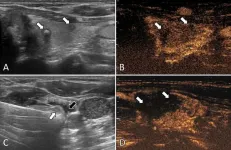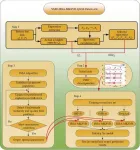(Press-News.org) If you want to spread a message about climate change and global warming, you need to adapt the message according to your intended audience and what you want to achieve.
Researchers have now developed an app to help people who want to spread their message on climate issues to ensure they generate the most support possible – be they researchers, politicians, various decision makers or legislators.
Huge survey involving 63 countries
59,000 people participated in surveys as part of the work on creating the app, and Norway was among the 63 countries involved. (You can read about what works best in Norway later in the article)
“The research team created this app that can help raise climate awareness and climate action globally. It is important to highlight messages that research shows are effective,” says Isabel Richter, Associate Professor at the Norwegian University of Science and Technology (NTNU’s) Department of Psychology.
In total, nearly 250 researchers were involved in the work of testing out different climate messages and tactics. Richter was part of the research team along with colleagues Senior Researcher Stepan Vesely and Professor Christian Klöckner, also from NTNU's Department of Psychology.
Previous studies have concentrated on checking attitudes towards individual measures. These might include recycling, use of public transport and energy-saving measures in the home. However, this study looked at a number of different variations. It also received answers from people all around the world, and not only Western, industrialised countries.
The researchers collected data between July 2022 and May 2023, so the figures are very recent. Both the app and the method behind it have now been presented in the Science Advances journal.
Multiple variations
The researchers exposed people to different variations of climate messages and tasks related to climate change. They then investigated their attitudes towards the different climate measures and other types of responses.
To measure how effective the methods were, they checked how willing the participants were to support different points of view and measures regarding climate change. For example, participants were asked whether they saw climate change as a serious threat, whether they supported a carbon tax on fossil energy, or whether they would plant trees themselves as part of the solution.
The researchers also tested whether participants were willing to share messages on social media, such as eating less meat in order to mitigate climate change.
Here are some of the results:
INTIMIDATION: “Climate change poses a serious threat to humanity”.
All tactics increased the likelihood of people sharing the climate message on social media, and this doom and gloom messaging style was most effective, at least globally. However, sharing requires little effort from the person doing it. In some countries, scare tactics reduce support for reforestation, a real measure that requires more effort but may work. Scare tactics also reinforced the negative attitudes of people who are already climate sceptics.
KNOWLEDGE: “99% of climate experts believe the planet is getting warmer and that climate change is primarily due to human activity”.
Some messages produce different results in different countries. This message, which appeals to the recipient’s sense of knowledge, increased support for climate measures in Romania by 9 per cent. In Canada, however, it reduced support by 5 per cent.
EMOTIONS: Writing a letter to a child who is close to you about the climate measures we are taking today to make the planet a liveable place in 2055.
This tactic increased support for climate measures in Nigeria, Russia, Ghana, Brazil and the United States by between 5 and 10 per cent. However, in countries such as India, Serbia and the United Arab Emirates, it had little effect, or even reduced support slightly.
Other variations the researchers tested included presenting climate measures that have already been successfully implemented in the past, or portraying climate measures as patriotic or popular choices. Participants were also asked to imagine writing a letter to their future self telling them what type of climate measures they should have taken.
86 per cent believe climate change is a threat
Attitudes varied widely from country to country and depended on both demographics and beliefs. The researchers also divided people into groups according to their nationality, political ideology, age, gender, education, and income.
The results showed that 86 per cent of the participants believed that climate change poses a threat.
More than 70 per cent were supporters of systematic and collective measures to address climate change.
No point in using scare tactics in Norway
Gloom and doom messages about climate change do not work in Norway.
“Writing a letter to future generations is most effective in increasing political support for climate measures, and in increasing the belief that climate change is a problem. The second most effective measure is to say that almost all climate experts agree,” Klöckner said.
Dire warnings and writing a letter to your future self were the least effective measures in Norway.
“All the alternatives made people in Norway less inclined to share a climate message on social media,” adds Richter. In other words, in complete contrast to the results seen globally.
However, people in Norway are quite eager to do something themselves, like planting trees. Here, it is most effective to focus on moral responsibility, the fact that many people acknowledge that climate change is a problem, and also that there is consensus among climate experts.
“The way that I choose to interpret it is that people in Norway like to do something concrete instead of just sharing things on social media,” says Associate Professor Richter.
Significant Norwegian contribution
Researchers from New York University and the University of Vienna led the study, but NTNU’s contribution was also significant.
“We were involved from the very beginning, developing possible interventions. We assessed intervention proposals from other partners, improved them in collaboration with the group and helped determine which interventions should actually be implemented,” says Vesely.
Vesely and Klöckner led and funded the collection of data in Norway.
Richter has good contacts in a number of African countries, the involvement of which is not always that easy to get in these types of studies. Among other things, she co-funded and participated in the collection of data from Kenya in particular.
Approximately 50 per cent of the Norwegian funding came from the Norwegian School of Economics (NHH). NHH also organised data collection through Ipsos.
Messages need to be adapted
Some activists believe that scare tactics are precisely what is needed in order for people to take action themselves. Others are of the opinion that it is depressing, demoralising and counterproductive. The study supports both of these hypotheses, but it depends on what you want to achieve.
Scare tactics work if your main focus is on getting people to post about their support on social media, but the venting of anger and frustration on Facebook, TikTok or X doesn’t necessarily help the environment. If you want to gather support for things that may actually work, you need to use other means.
It is quite easy to get people to do things that do not require much effort, such as sharing a message on social media.
“Sharing something on social media can in itself feel like taking action. People may feel like ‘Now that I have done something, I can get on with my life’. This is behaviour with a very low threshold,” says Associate Professor Richter.
However, based on the results from around the world, none of the methods made people more willing to plant more trees for the sake of the environment – a measure that means people have to put an effort in themselves.
“The findings show that spreading a climate message depends on people’s attitudes towards climate change in the first place. Legislators and campaigners must adapt their messaging to the public,” says Madalina Vlasceanu, Assistant Professor at New York University and one of the people who led the research project.
Reference: Madalina Vlasceanu et al. Addressing climate change with behavioral science: A global intervention tournament in 63 countries. Sci. Adv.10,eadj5778(2024). DOI:10.1126/sciadv.adj5778
END
Gloom and doom warnings about climate change do not work
If we want people to act to curb climate change, we have to find a way to motivate them
2024-04-02
ELSE PRESS RELEASES FROM THIS DATE:
The 2024 Career Optimism Index® study highlights shift from the great resignation to a great talent stagnation – and how employers can break through
2024-04-02
Today the University of Phoenix Career Institute® released its 2024 Career Optimism Index®, a comprehensive study examining the state of American workers' career trajectories and sentiments about the future of their job and career opportunities. This year's Index, the fourth consecutive year it has been fielded, reveals that workers and employers are facing a critical moment of talent stagnation in the workplace.
More than half (53%) of Americans report feeling easily replaceable in their job position and 64% of workers say their company does not offer opportunities ...
Minimally invasive procedure may spare patients from thyroid surgery
2024-04-02
OAK BROOK, Ill. – In a 10-center study, microwave ablation offered progression free survival rates and fewer complications than surgery in the treatment of a form of thyroid cancer known as papillary thyroid carcinoma (PTC), according to research published today in Radiology, a journal of the Radiological Society of North America (RSNA).
The most common type of thyroid cancer, PTC often presents with multifocality, meaning that two or more bumps or nodules (papillae) are found within the thyroid gland. The occurrence of multifocality within PTC cases is notably frequent, ranging between approximately ...
Noted UCLA neurologist Dr. Rhonda Voskuhl wins 2024 John Dystel Prize for multiple sclerosis research
2024-04-02
[New York, April 2, 2024] – Rhonda Voskuhl, M.D., an internationally recognized neurologist and investigator at the University of California, Los Angeles, is the winner of the 2024 John Dystel Prize for Multiple Sclerosis Research. She is being recognized for her innovative research to understand mechanisms underlying sex differences in multiple sclerosis (MS) and advancing women’s health.
Women are much more susceptible than men to developing MS, an immune-mediated neurological disease. Voskuhl has conducted extensive basic and clinical research ...
Novel vaccine, PfSPZ-LARC2 Vaccine, to prevent malaria infection developed by Seattle Children’s Research Institute and Sanaria ready for human testing
2024-04-02
April 2, 2024 – In a report published on March 21, 2024 in EMBO Molecular Medicine (A replication competent Plasmodium falciparum parasite completely attenuated by dual gene deletion) investigators at Seattle Children’s Research Institute and Sanaria Inc. describe the development of a whole malaria parasite vaccine strain that infects the liver, develops to the late liver stage, and then gets completely stuck and cannot burst out of the liver to cause symptomatic blood infection. The creation of this strain called LARC2 (Late liver-stage Arresting, Replication Competent) was accomplished by deletion of only two parasite genes out of the approximately 5,000 in the ...
A hybrid data driven framework considering feature extraction for battery state of health estimation and remaining useful life prediction
2024-04-02
A paper proposing a hybrid data driven framework considering feature extraction for battery state of health estimation and remaining useful life prediction was published in the journal Green Energy and Intelligent Transportation on 29 March 2024.
VMD is used for completely non-recursive modal variation to deal with signals. The optimal solution of the variational problem is obtained finally by effective decomposition component of the given signal. By iteration, the VMD algorithm can decompose the signals into some intrinsic ...
Press passes available now for NUTRITION 2024 to be held June 29–July 2
2024-04-02
Complimentary press passes are now available for NUTRITION 2024, the annual flagship meeting of the American Society for Nutrition. Join us June 29–July 2 in Chicago for the latest developments in nutrition research, practice and policy.
As the pre-eminent meeting in nutrition science, NUTRITION attracts thousands of scientists, practitioners, policymakers, advocacy leaders and industry professionals each year. Reporters are invited to attend in person to connect with the field’s leaders and learn about exciting scientific ...
UMass Amherst-led team creates biofilm-resistant glass for marine environments
2024-04-02
AMHERST, Mass. – A group of researchers led by University of Massachusetts Amherst engineers have created ultraviolet (UV) rays-emitting glass that can reduce 98% of biofilm from growing on surfaces in underwater environments, as reported in the journal Biofilm.
Biofilm is a slimy layer of various types of microorganisms that grows on wet surfaces. “If you look down your sink and touch the inner side of it—that slimy substance is biofilm,” describes Mariana Lanzarini-Lopes, ...
Heart health declines rapidly after menopause
2024-04-02
A woman’s cardiovascular risk can rise sharply after she goes through menopause, quickly catching up to men of a similar age and health profile, according to new findings presented at the American College of Cardiology’s Annual Scientific Session. Researchers said the study underscores the importance of recognizing and addressing early warning signs of heart disease risk in women as they lose the protective effects of estrogen after menopause.
“This is a unique study cohort of only post-menopausal ...
Majority of people with heart disease consume too much sodium
2024-04-02
Individuals with heart disease stand to gain the most from a low-sodium diet but, on average, consume over twice the recommended daily sodium intake, according to a study being presented at the American College of Cardiology’s Annual Scientific Session.
Sodium is an essential nutrient, but consuming too much can raise blood pressure, which damages blood vessels and forces the heart to work harder. Excess sodium can also cause the body to retain fluid, exacerbating conditions like heart failure. The current U.S. Dietary Guidelines put out by the U.S. Department of Agriculture ...
Study links e-cigarette use with higher risk of heart failure
2024-04-02
People who use e-cigarettes are significantly more likely to develop heart failure compared with those who have never used them, according to one of the largest prospective studies to date investigating possible links between vaping and heart failure. The findings are being presented at the American College of Cardiology’s Annual Scientific Session.
Heart failure is a condition affecting more than 6 million U.S. adults in which the heart becomes too stiff or too weak to pump blood as effectively as it should. It can often lead to debilitating symptoms and frequent hospitalizations as people age. Electronic nicotine products, which include ...
LAST 30 PRESS RELEASES:
Bureaucracy Index 2026: Business sector hit hardest
ECMWF’s portable global forecasting model OpenIFS now available for all
Yale study challenges notion that aging means decline, finds many older adults improve over time
Korean researchers enable early detection of brain disorders with a single drop of saliva!
Swipe right, but safer
Duke-NUS scientists identify more effective way to detect poultry viruses in live markets
Low-intensity treadmill exercise preconditioning mitigates post-stroke injury in mouse models
How moss helped solve a grave-robbing mystery
How much sleep do teens get? Six-seven hours.
Patients regain weight rapidly after stopping weight loss drugs – but still keep off a quarter of weight lost
GLP-1 diabetes drugs linked to reduced risk of addiction and substance-related death
Councils face industry legal threats for campaigns warning against wood burning stoves
GLP-1 medications get at the heart of addiction: study
Global trauma study highlights shared learning as interest in whole blood resurges
Almost a third of Gen Z men agree a wife should obey her husband
Trapping light on thermal photodetectors shatters speed records
New review highlights the future of tubular solid oxide fuel cells for clean energy systems
Pig farm ammonia pollution may indirectly accelerate climate warming, new study finds
Modified biochar helps compost retain nitrogen and build richer soil organic matter
First gene regulation clinical trials for epilepsy show promising results
Life-changing drug identified for children with rare epilepsy
Husker researchers collaborate to explore fear of spiders
Mayo Clinic researchers discover hidden brain map that may improve epilepsy care
NYCST announces Round 2 Awards for space technology projects
How the Dobbs decision and abortion restrictions changed where medical students apply to residency programs
Microwave frying can help lower oil content for healthier French fries
In MS, wearable sensors may help identify people at risk of worsening disability
Study: Football associated with nearly one in five brain injuries in youth sports
Machine-learning immune-system analysis study may hold clues to personalized medicine
A promising potential therapeutic strategy for Rett syndrome
[Press-News.org] Gloom and doom warnings about climate change do not workIf we want people to act to curb climate change, we have to find a way to motivate them




